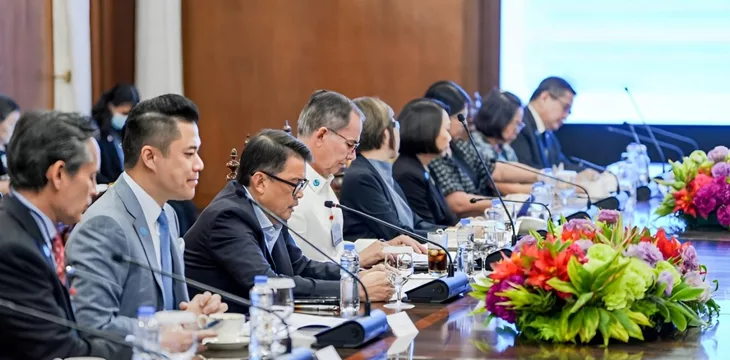|
Getting your Trinity Audio player ready...
|
Several key bills that will address the country’s socioeconomic development have been passed in the House of Representatives. Tagged as priorities by President Ferdinand “Bongbong” Marcos Jr.’s advisors, and backed by the Private Sector Advisory Council (PSAC), these bills are one step closer to becoming law ahead of the House’s June 2024 deadline for priority bills.
In regular council meetings with President Marcos, Jr., PSAC identified three bills that should be prioritized by the government for their passage. These include a bill to impose value-added tax on digital services, the E-Governance bill, and a bill creating the Department of Water Resources and Services. House Speaker Martin Romualdez reported that these bills, among 16 others, have been approved on the third and final reading by the House of Representatives as of March 19.
Notably, the PSAC Infrastructure Sector, led by PSAC Lead Convenor and Aboitiz Group President and Chief Executive Officer (CEO) Sabin Aboitiz, had emphasized the need for a national governing body for water resources since March of last year. PSAC had recommended it to be certified as urgent, while additionally suggesting the adoption of an Integrated Water Resources Management Program.
“As a member of the Private Sector Advisory Council, we help to urge swift action by recommending to the President the passing of key bills like digital service tax,
E-Governance, and the Department of Water Resources. Establishing a national governing body for water resources is crucial for sustainable management,” said Aboitiz.
Having now been cleared by the House, the bills will be taken up by the Senate for their approval. Speaker Romualdez said that the House has already taken up all but three of the 59 priority bills raised by the Legislative-Executive Development Advisory Council (LEDAC). As of this writing, President Marcos Jr. has signed into law 14 of them, including the recently passed Philippine Salt Industry Development Act and the New Philippine Passport Act.
About Private Sector Advisory Council
President Ferdinand “Bongbong” Marcos Jr. strategically established the Private Sector Advisory Council (PSAC) to create and strengthen innovative new synergies between the private and public sectors. The PSAC comprises business leaders and experts from six main sectoral groups: Agriculture, Digital Infrastructure, Jobs, Healthcare, Build-Build-Build, and Tourism.
The Council helps the government deliver on its commitment to transform the Philippine economy by implementing robust infrastructure programs, creating more jobs and attracting more investors, digitizing processes, and improving agricultural productivity through the recalibration of micro, small and medium enterprises (MSMEs), jumpstart Philippine Tourism and ensuring an equitable, sustainable, and inclusive business landscape for Filipinos.
PSAC will continuously recommend modern policy development to the government and report regularly to the President to provide feedback and adjust recommendations based on what is happening on the ground.

 02-28-2026
02-28-2026 




